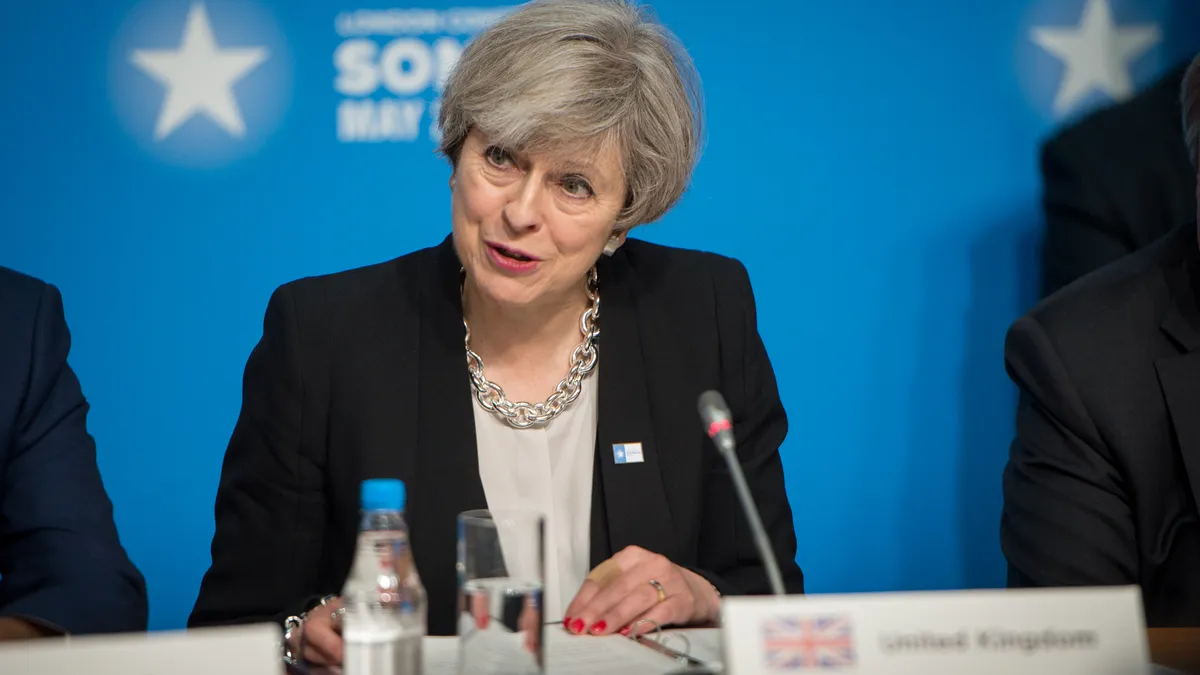UPDATE: Jan. 16, 2019: U.K. Prime Minister Theresa May survived a motion of no confidence, on a vote of 325 to 306. She will need to present a Brexit "Plan B" to Parliament by next Monday.
Dive Brief:
- Businesses and industry associations warned chaos could ensue after U.K. lawmakers rejected Prime Minister Theresa May's Brexit deal, which sought an "orderly departure" from the European Union on March 29 and a 21-month transition period to work out a free trade deal.
- The vote against May's deal — 432 against and 202 for — increases the possibility of a "no-deal" Brexit, in which leaders would have no transition period to hammer out a trade deal. This would create trade barriers and tariffs between the U.K. and Europe, likely resulting in delays at British and European ports.
- "We would urge the Government to ... do whatever is necessary to avoid a disorderly withdrawal from the EU," the British Ports Association said in a tweet. Stephen Phipson, CEO of the U.K. manufacturers' organization EEF, said a no deal scenario would be "disastrous," and businesses are suffering "impossible uncertainty."
I take note with regret of the outcome of the vote in the @HouseofCommons this evening. I urge the #UK to clarify its intentions as soon as possible. Time is almost up #Brexit https://t.co/SMmps5kexn
— Jean-Claude Juncker (@JunckerEU) January 15, 2019
Dive Insight:
Tuesday night's vote in the U.K. parliament created further uncertainty for citizens, markets and businesses, and the drama is far from over. May will face a vote of no-confidence Wednesday evening, which could result in a new Prime Minister of even a snap election, bringing further turmoil in the U.K. government — although May's government is expected to win the vote.
Many companies engaged in cross-border business have already activated contingency plans in case of a no-deal exit from the EU. These range from stockpiling goods and duplicating manufacturing processes, particularly in the pharmaceutical industry, to pausing production altogether. Honda plans to suspend production at its U.K. plant for six days in April after Brexit.
The results of Tuesday's vote may kick these no-deal contingency plans into high gear, with just 72 days left until the deadline. Even with careful planning, however, risks from a no-deal scenario are not eliminated.
"Whilst plans are in place to mitigate some of the worst aspects of this, the fundamental dangers to free flowing trade remain," the British Ports Association said.
We note developments in Parliament and the increasing possibility of a ‘no deal’ #Brexit outcome. We would urge the Government to clarify its alternative plans immediately and do whatever is necessary to avoid a disorderly withdrawal from the EU. #BrexitVote pic.twitter.com/mJ8oY8NBqw
— British Ports Association (@britishports) January 15, 2019
U.K. businesses, while likely to suffer the biggest blow from a no-deal Brexit, are not the only ones facing significant risks. The German auto industry association "VDA" said the "consequences of a 'no deal' would be fatal." Automotive supply chains have been particularly wary of Brexit, due to their complex nature and heavy reliance on trade flows across borders.
U.S. businesses could face complications, too. "Where US or other non-European businesses maintain a European distribution centre in the UK, they should consider the potential for double tariffs on products exported to the UK and then re-exported to the EU27 following Brexit," David Gent, Legal Director at the law firm Bird & Bird wrote.
More generally, a no-deal Brexit could send the stock market tumbling, affecting global economies and confidence.
Most industry associations have focused attention on a no-deal scenario, but the reality is, several other outcomes are possible:
- The EU and U.K. could negotiate another deal.
- The deadline to withdraw could be delayed.
- The U.K. could hold another referendum and stay in the EU.
While the possibility of remaining in the union may be appealing to many businesses, the wide array of options continues to cast a shadow of uncertainty, leaving industry navigating any and all scenarios.















